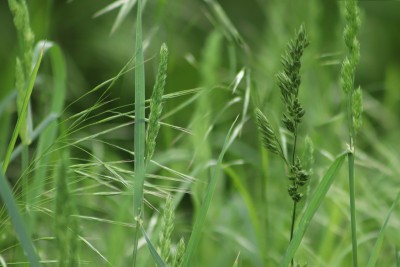The Pros and Cons of Seeding Pasture with Big Box Store Mixes
Amy Barkley, Livestock Specialist
Southwest New York Dairy, Livestock and Field Crops Program

As we work in our barns or sit in our houses, looking upon our fields encased in snow, we're reflecting on the year and making decisions as to which pastures we're going to renovate or improve. Once those well thought out decisions have been made, we go to order seed, only to find that prices have skyrocketed. There is also very little seed available. Both are a result of last year's drought in Oregon, where much of our pasture seed comes from. This wasn't in the plan! What do we do now?
While it can be tempting, my advice is to not source seed from a big box or garden supply store. Why not, you ask? Let's break it into pros and cons.
Pros:
You may be able to get seed this year. If the seed mixes in the stores are sourced from regions other than Oregon, there's a chance that the store shelves may be stocked, and you may be able to get something in the ground.
Cons:
What's in the seed mix? Many contractor mixes are made up of fescue, bluegrass, and ryegrass. Some strains of these grasses are palatable, but others may not be. Some may produce well, others may not. Some of the fescues may have potential toxicity issues as well, since these varieties aren't selected for grazing. You also lose the potential to select for seed that does well in partial shade, wetter fields or clay soils, etc.
Nutritional composition is highly variable. The grasses selected for these mixes are based on establishment aggression, vegetation density, growth pattern, and color. They haven't been selected for any of the features which make them good livestock feed such as fiber digestibility, palatability, and protein content.
What is the yield going to look like? Many turfgrasses have been genetically selected to stay short or to tolerate low mowing. Therefore, if you're looking for high yields or multiple cuttings, these grasses may not even have the genetic potential to perform, wasting space, time resources, and fertilizer.
Regional adaptation is important for pasture longevity and production. Many of the farm seed mixes sold in SWNY are adapted for our climate. While there are turf seed mixes adapted to the Northeast, there is still high variation there. Furthermore, by not purchasing pasture seed from a reliable source, you miss out on the expertise and advice of those who work with these varieties day in and day out, who can share which varieties will do best on your farm.
Disease resistance packages are unknown. There is a chance that turfgrasses in a mix are not bred to be resistant to the diseases that affect stands of hay and pasture in our region. Diseases like rust, blights, leaf spots, wilts, etc. may gain a foothold in a pasture or hayfield with non-resistant species.
Once the excitement of finding grass seed at a big box or home improvement store passes and the cards are laid on the table, the cons list certainly outweighs the pros. Even if this turf seed is applied to your pasture for a quick green-up this spring, you'll likely lose money in the long run from reduced quality, production, and the ultimate need to redo the pastures sooner than you would have had to if you'd purchased a quality seed mix from a reputable farm seed dealer.
Upcoming Events
WNY Pastureland Conversion & Soil Health Field Day
July 16, 2025
Middleport, NY
Join American Farmland Trust for the Western New York Soil Health Field Day on July 16, 2025, at Zeliff Farm in Middleport, NY, from 9:00 AM-3:15 PM. Learn about pasture conversion, soil health benchmarking, biochar in grazing systems, and best grazing practices. Plus, enjoy hands-on demos with the NY Soil Health Trailer, drones, and cover crops! Check out the attached agenda for more information about the field day and REGISTER HERE. Zeliff Farms is a regenerative beef operation who has recently partnered with AFT on outreach and education to farmers including learning circles and evaluating biochar effects on soil health.
IPM Strategies to Protect Corn and Soybean Seed in NY
July 30, 2025
Hamburg , NY
SWNYDLFC and Cornell IPM are hosting a grower meeting to discuss integrated pest management strategies for protecting corn and soybean seed in New York.
FAMACHA Training for Sheep and Goat producers in Woodhull NY
August 13, 2025 : FAMACHA Training in Woodhull
Woodhull, NY
Join us for a discussion and hands-on training for internal parasite integrated pest management in sheep and goats. Certification is available to all students participating in the workshop.
Announcements
No announcements at this time.





